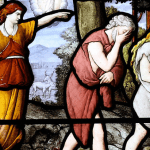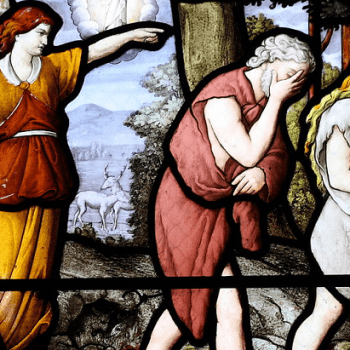 In segment 3 we saw that we can repent of all our sins at once. In every example: Alma, Enos, Benjamin’s people, Lamoni, his father, the King, the wicked Lamanites in Helaman 5, all had broken hearts, all pleaded to Christ for mercy, and all were forgiven and experienced peace and joy.
In segment 3 we saw that we can repent of all our sins at once. In every example: Alma, Enos, Benjamin’s people, Lamoni, his father, the King, the wicked Lamanites in Helaman 5, all had broken hearts, all pleaded to Christ for mercy, and all were forgiven and experienced peace and joy.
And yet, a comprehensive forgiveness event simply isn’t accepted by most Latter-Day-Saints. It’s just, well, too much forgiveness–too much like…grace. And yet, wasn’t that the point of so many of Christ’s parables–forgiveness beyond what we deserve? Didn’t the publican in Luke 18 receive too much forgiveness and grace? Didn’t the prodigal son receive too much forgiveness and grace? Isn’t forgiveness of a 10,000-talent debt too much forgiveness and grace? Receiving more forgiveness than we deserve is the definition of grace!
So even though we love these stories, we just don’t believe they apply to us; we want to be like Smith Barney and EARN it. (Google it). But have you ever read an example of that–where Christ requires improvement before bestowing forgiveness? Ever read where the Lord says, “Wow Son, I’ve saved a lot of sinners before, but you simply have too many; can’t you try just a little harder? Can you maybe conquer, oh, let’s say… half of those, and then we’ll talk?” I hope that sounds a little silly, because that’s exactly how silly it is to think that Christ won’t save you until you’ve “done all you can do.”
Remember Benjamin’s people? Despite being very diligent and highly favored of the Lord, they were still “nothing”, were still worthless because they were still fallen. Their exemplary obedience could not earn redemption from the fall; only Christ could redeem them from the fall, and He could do that because of their faith–and it happened immediately. Alma was also forgiven, born again, and redeemed, immediately. You too, can be forgiven and redeemed immediately! (Alma 34:31).
Remember the Kings prayer, “… if thou art God… I will give away all my sins to know thee” (Alma 22:18). Isn’t that phrasing interesting? The King could have said, “I promise to buckle down and improve.” But instead, he said, “I will give away all my sins.” Give them to whom? Who on earth wants someone’s sins!? Well, no one on earth, but the Savior will take them. Christ forgives every sin we will ever commit, and in the same event he will root out our fallen nature and change our hearts, a change so complete that it’s called becoming a new creature–a change so immediate that it’s called being born again. And only after this change are we reconciled with God.
So we see that repentance is not endless self-improvement, it’s a transaction–we give all our sins to Christ in exchange for a purified heart. What a transaction! What a bargain! What a Savior! “the way is prepared from the fall of man, and salvation is free” (2 Ne 2:4).
In these accounts, and in my explanation, we are beginning to see some new terms. Everyone understands the concept of being forgiven, but not everyone understands terms like, “redeemed”, “born again”, “new creature”, “made whole”, “justified”, “reconciled”, “in Christ”, etc. What do all these terms mean, how are they related, and when are they achieved? Understanding them and fitting them into our gospel puzzle is easier than you might expect.
These terms do not refer to different events; they refer to our connection with many different entities; we have a relationship with God, with Christ, with the fall, with the law, with ourselves, and with eternity.
So, at the time when we manifest faith in Christ and receive a forgiveness of sins, instantly our relationship with all of these entities’ changes–we are born again as children of Christ, we are justified with the law, we are redeemed from the fall (Mos 16:5; Ether 3:13), we are reconciled with God, and we are saved from punishment for our sins–from the demands of justice. So, when we read these different words, they do not refer to multiple events, but rather to our change of status with these multiple entities.
Accounts in the scriptures use these terms–and more–interchangeably, in reference to a single redemptive event where one humbly asks for and receives a remission of sins, and experiences a change of nature and a change of status. This event is always followed by a feeling of exquisite peace, joy, and love for God and man.
So these terms refer to effects of forgiveness and they all happen at once. Here is an example of why it’s important to understand this: many people believe that they’ve been born again, but think they are still battling the natural man. Doctrinally that is impossible. These two terms are mutually excluding conditions. Just like a caterpillar becomes a butterfly, but can’t be both at the same time. Just like Clark Kent and Superman cannot be found in the same room simultaneously, neither can someone be born again, and simultaneously be the natural man.
If you are LDS and have courageously read thus far, I’m guessing you are thinking, ok, even if there is a forgiveness/redeemed/born again event, can’t we lose that when we sin? No and yes. Not by sin; remember our sins have been forgiven–all of them. But yes, our redemption can be lost, but only by forgetting how and by whom it was given–faith in Jesus Christ. Benjamin says we retain our remission of sins by remembering our worthlessness, remembering our forgiveness, and continuing in humble daily prayer. That’s it, that’s enduring to the end (Mosiah 4:11,12).
Doing those simple things makes our redemption secure. And the more you ponder these things, you see that the terms themselves imply permanency. Redeemed means to be purchased–saved from the fall. Once Christ has purchased you, adopted you, can you imagine him in the “Returns” line, telling the devil, “Sorry, I thought this one would show more improvement; he just hasn’t. Or would Christ tell the clerk, “Yes, I am God, I can create life and move mountains, but this one has flaws even I can’t fix. Yes, I am God and I know every detail of the future, but I was shocked that this one would sin again!” Those conversations won’t happen.
So, the very use of these words implies a profound change of status that is virtually permanent. Justified means we are pardoned from punishment. How could one be pardoned from punishment, and then be punished? How could one who is adopted by Christ, be un-adopted? How could one who has obtained mercy from justice, be condemned by justice? How could one who is born again be un born? How could one who is imputed with the righteousness of Christ need more righteousness!?
Paul teaches the security of our forgiveness so succinctly; “if we were forgiven when we were enemies with God, then now that we have been reconciled with God, won’t Christ be even more inclined to save us?” Yes! Of course! Our joy and peace testify of this! (Romans 5:8-11).
“whom he called, them he also justified: and whom he justified, them he also glorified. What shall we then say to these things? If God be for us, who can be against us?” (Romans 8:30).
After being redeemed we will slowly but certainly be changed by Christ. Wasn’t that the point of all his miracles, that he can kill anything that needs to be killed, and he can nourish and grow our faintest virtue?














